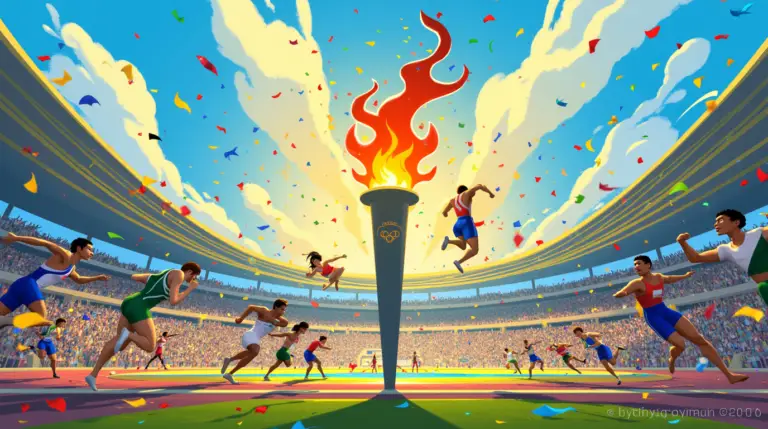Introduction to the Olympics
The Olympic Games: Uniting the World Through Sport Introduction: A Global Celebration of Excellence and Unity
Welcome to the world of the Olympic Games, the planet’s premier international sporting event. Held every four years, with Summer and Winter Games alternating every two years, the Olympics bring together thousands of athletes from almost every nation on Earth to compete in a wide variety of sports.
More than just a competition, the Olympics represent a powerful ideal: using sport to promote peace, understanding, and friendship among nations. It’s a time when the world pauses to witness incredible displays of human potential, dedication, and sportsmanship. From the iconic opening ceremonies to the thrilling final moments of competition, the Games capture the global imagination like no other event, celebrating the Olympic values of Excellence, Friendship, and Respect.
A Rich History: From Ancient Olympia to the Modern Era

The roots of the Olympic Games stretch back thousands of years to ancient Greece.
The Ancient Games: Traditionally dated to 776 BC, the ancient Olympics were held in Olympia, Greece, as part of a religious festival honoring the god Zeus. Initially a one-day event featuring only a foot race (the stadion), the Games grew over centuries to include events like boxing, wrestling, chariot racing, and the pentathlon. A sacred truce, the Ekecheiria, was declared to allow athletes and spectators to travel safely to and from the Games. These ancient Games continued for nearly 12 centuries before being abolished by the Roman Emperor Theodosius I around 393 AD.
The Modern Revival: The Games lay dormant for about 1,500 years until the vision of a French educator, Baron Pierre de Coubertin, brought them back to life. Inspired by the ancient ideal and a desire to promote physical education and international understanding, Coubertin spearheaded the movement that led to the founding of the International Olympic Committee (IOC) in 1894.
Athens 1896: The first modern Olympic Games were held in Athens, Greece, in 1896, symbolically linking the new era with its ancient origins. Athletes from 14 nations competed in 9 sports.
Growth and Evolution: Since then, the Olympic Games have grown exponentially. The Winter Olympics were introduced in 1924 (Chamonix, France) to feature snow and ice sports. The participation of women, initially limited, has steadily increased, striving towards gender equality. The number of participating nations, athletes, and sports has expanded dramatically, making the Games a truly global spectacle. Despite challenges like political boycotts, security threats, and doping scandals, the Olympic movement has endured and adapted, remaining a powerful force in the world.
1. The Iconic Symbols
The Olympic Rings: Five interlocking rings (blue, yellow, black, green, and red) on a white background. They represent the five inhabited continents (Europe, Asia, Africa, Oceania, Americas) united by Olympism, while the colours were chosen because at least one appears on the flag of every nation in the world.
The Olympic Flame and Torch Relay: Lit in Ancient Olympia using sunlight and a parabolic mirror, the flame is carried by a torch relay to the host city. It symbolizes the link between the ancient and modern Games, purity, peace, and the enduring spirit of the Olympics. Lighting the cauldron during the Opening Ceremony marks the official start of the Games.
The Olympic Motto: «Citius, Altius, Fortius» (Latin for «Faster, Higher, Stronger»). In 2021, the word «Communiter» (Latin for «Together») was added, emphasizing solidarity: «Citius, Altius, Fortius – Communiter».
2. Summer vs. Winter Games
Summer Olympics: Feature traditional track and field, swimming, gymnastics, team sports like basketball and football (soccer), and many others. Held in the summer season of the host city.
Winter Olympics: Focus on sports performed on snow or ice, such as skiing, snowboarding, figure skating, ice hockey, and bobsleigh.
The two Games are staggered, so there is an Olympic Games event (either Summer or Winter) every two years.
3. The Paralympic Games
Held shortly after the Olympic Games in the same host city, the Paralympic Games are the premier international multi-sport event for athletes with disabilities. They showcase the incredible abilities and determination of Paralympians and have grown significantly in scale and recognition, promoting inclusion and challenging perceptions.
4. A Global Stage
Hosting the Olympics brings immense global attention to a city and country. It often involves significant infrastructure development and offers a unique platform to showcase culture, promote tourism, and create lasting legacies. The Opening and Closing Ceremonies are elaborate cultural spectacles watched by billions worldwide.